现在完成时与完成进行时for和since练习题
- 格式:doc
- 大小:27.50 KB
- 文档页数:3
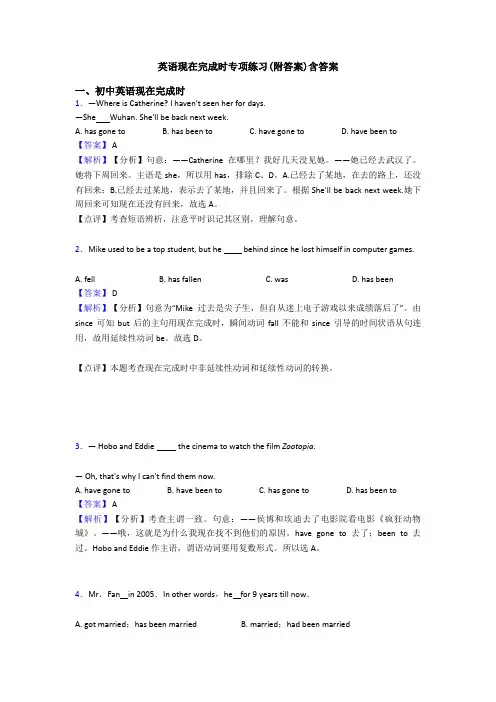
英语现在完成时专项练习(附答案)含答案一、初中英语现在完成时1.—Where is Catherine? I haven't seen her for days.—She Wuhan. She'll be back next week.A. has gone toB. has been toC. have gone toD. have been to【答案】 A【解析】【分析】句意:——Catherine在哪里?我好几天没见她。
——她已经去武汉了。
她将下周回来。
主语是she,所以用has,排除C、D。
A.已经去了某地,在去的路上,还没有回来;B.已经去过某地,表示去了某地,并且回来了。
根据She'll be back next week.她下周回来可知现在还没有回来,故选A。
【点评】考查短语辨析,注意平时识记其区别,理解句意。
2.Mike used to be a top student, but he behind since he lost himself in computer games.A. fellB. has fallenC. wasD. has been【答案】 D【解析】【分析】句意为“Mike过去是尖子生,但自从迷上电子游戏以来成绩落后了”。
由since可知but后的主句用现在完成时,瞬间动词fall不能和since引导的时间状语从句连用,故用延续性动词be。
故选D。
【点评】本题考查现在完成时中非延续性动词和延续性动词的转换。
3.— Hobo and Eddie the cinema to watch the film Zootopia.— Oh, that's why I can't find them now.A. have gone toB. have been toC. has gone toD. has been to【答案】 A【解析】【分析】考查主谓一致。
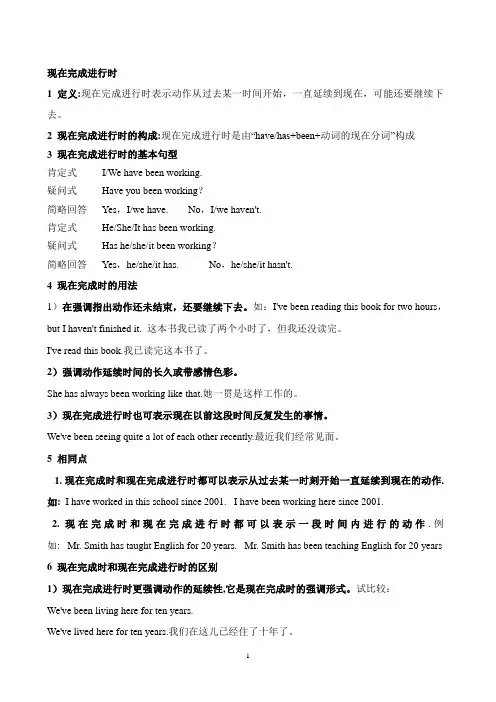
现在完成进行时1 定义:现在完成进行时表示动作从过去某一时间开始,一直延续到现在,可能还要继续下去。
2 现在完成进行时的构成:现在完成进行时是由“have/has+been+动词的现在分词”构成3 现在完成进行时的基本句型肯定式I/We have been working.疑问式Have you been working?简略回答Yes,I/we have. No,I/we haven't.肯定式He/She/It has been working.疑问式Has he/she/it been working?简略回答Yes,he/she/it has. No,he/she/it hasn't.4 现在完成时的用法1)在强调指出动作还未结束,还要继续下去。
如:I've been reading this book for two hours,but I haven't finished it. 这本书我已读了两个小时了,但我还没读完。
I've read this book.我已读完这本书了。
2)强调动作延续时间的长久或带感情色彩。
She has always been working like that.她一贯是这样工作的。
3)现在完成进行时也可表示现在以前这段时间反复发生的事情。
We've been seeing quite a lot of each other recently.最近我们经常见面。
5 相同点1. 现在完成时和现在完成进行时都可以表示从过去某一时刻开始一直延续到现在的动作.如: I have worked in this school since 2001. I have been working here since 2001.2. 现在完成时和现在完成进行时都可以表示一段时间内进行的动作.例如: Mr. Smith has taught English for 20 years. Mr. Smith has been teaching English for 20 years 6 现在完成时和现在完成进行时的区别1)现在完成进行时更强调动作的延续性,它是现在完成时的强调形式。
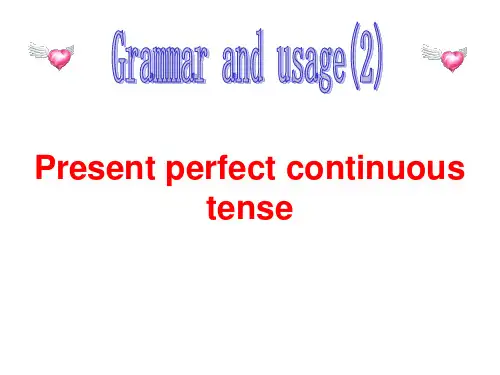
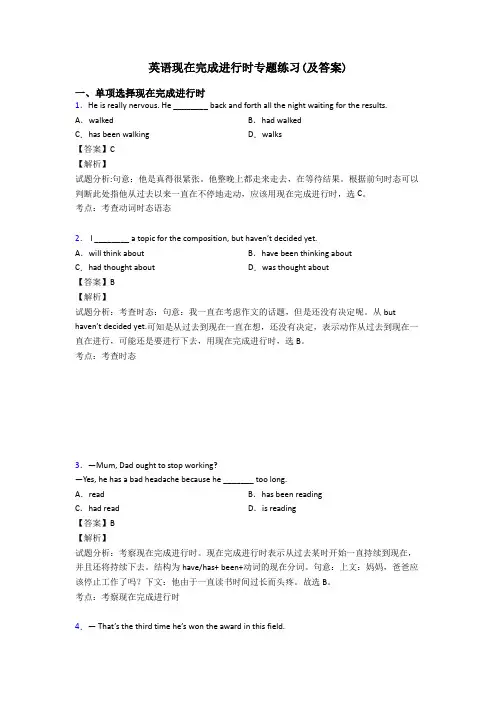
英语现在完成进行时专题练习(及答案)一、单项选择现在完成进行时1.He is really nervous. He ________ back and forth all the night waiting for the results. A.walked B.had walkedC.has been walking D.walks【答案】C【解析】试题分析:句意:他是真得很紧张。
他整晚上都走来走去,在等待结果。
根据前句时态可以判断此处指他从过去以来一直在不停地走动,应该用现在完成进行时,选C。
考点:考查动词时态语态2.I ________ a topic for the composition, but haven’t decided yet.A.will think about B.have been thinking aboutC.had thought about D.was thought about【答案】B【解析】试题分析:考查时态:句意:我一直在考虑作文的话题,但是还没有决定呢。
从but haven’t decided yet.可知是从过去到现在一直在想,还没有决定,表示动作从过去到现在一直在进行,可能还是要进行下去,用现在完成进行时,选B。
考点:考查时态3.—Mum, Dad ought to stop working?—Yes, he has a bad headache because he _______ too long.A.read B.has been readingC.had read D.is reading【答案】B【解析】试题分析:考察现在完成进行时。
现在完成进行时表示从过去某时开始一直持续到现在,并且还将持续下去。
结构为have/has+ been+动词的现在分词。
句意:上文:妈妈,爸爸应该停止工作了吗?下文:他由于一直读书时间过长而头疼。
故选B。
考点:考察现在完成进行时4.—That’s the third time he’s won the award in this field.— Yes. He ______ his maximum potential in the past decade.A.explored B.is exploring C.has been exploring D.has explored【答案】C【解析】考查时态。
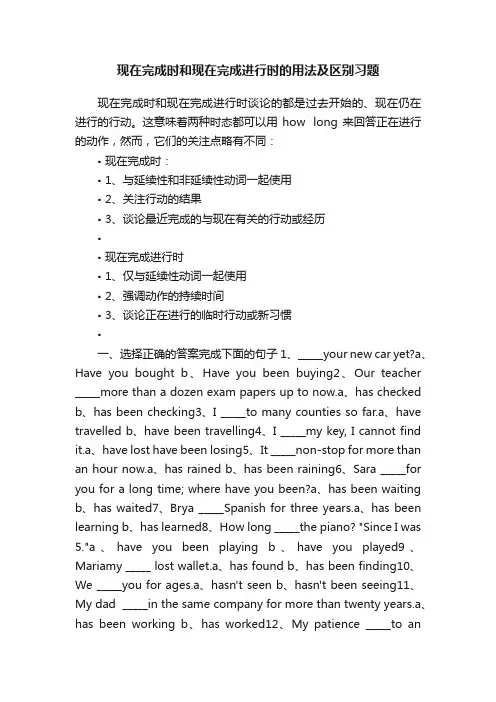
现在完成时和现在完成进行时的用法及区别习题现在完成时和现在完成进行时谈论的都是过去开始的、现在仍在进行的行动。
这意味着两种时态都可以用 how long 来回答正在进行的动作,然而,它们的关注点略有不同:▪现在完成时:▪1、与延续性和非延续性动词一起使用▪2、关注行动的结果▪3、谈论最近完成的与现在有关的行动或经历▪▪现在完成进行时▪1、仅与延续性动词一起使用▪2、强调动作的持续时间▪3、谈论正在进行的临时行动或新习惯▪一、选择正确的答案完成下面的句子1、_____your new car yet?a、Have you bought b、Have you been buying2、Our teacher _____more than a dozen exam papers up to now.a、has checked b、has been checking3、I _____to many counties so far.a、have travelled b、have been travelling4、I _____my key, I cannot find it.a、have lost have been losing5、It _____non-stop for more than an hour now.a、has rained b、has been raining6、Sara _____for you for a long time; where have you been?a、has been waiting b、has waited7、Brya _____Spanish for three years.a、has been learning b、has learned8、How long _____the piano? "Since I was 5."a、have you been playing b、have you played9、Mariamy _____ lost wallet.a、has found b、has been finding10、We _____you for ages.a、hasn't seen b、hasn't been seeing11、My dad _____in the same company for more than twenty years.a、has been working b、has worked12、My patience _____to anend.a、has come b、has been coming13、How long _____TV, your eyes look so red.a、have you been watching b、have you watched14、I _____for over eight hours now. I am extremely tired.a、have driven b、have been driving15、The jury _____a verdict after three hours.a、has reached b、has been reaching二、答案及解析1、Have you bought解析:yet 是现在完成时的信号词,因此这里选 Have you bought。

时态练习(三)一.用since和for填空1.______two years2.____two years ago3.___last month4.______ 19995._______yesterday6._______ 4 o’clock7 4 hours 8._____an hour ago9.___we were children 10._____ lunch time11.____ she left here12. He has lived in Nanjing ___ the year before last.13. I’ve known him ______ we were children.14. Our teacher has studied Japanese ______ three years.15. She has been away from the city ______ about ten years.16. It’s about ten years __________ she left the city.二.单项选择。
1、Both his parents look sad . Maybe they ______what's happened to him .A. knewB. have knownC. must knowD.will know2、He has _______ been to Shanghai , has he ?A. alreadyB.neverC.everD.still3、Have you met Mr Li ______?A. justB. agoC.beforeD. a moment ago4、The famous writer _____ one new book in the past two year .A. is writingB.was writingC.wroteD.has written5、—Our country ______ a lot so far .—Yes . I hope it will be even ______ .A.has changed ; wellB.changed ; goodC.has changed ; betterD.changed ; better6、Zhao Lan ______already ______in this school for two years .A. was ; studyingB. will ; studyC. has ; studiedD. are ; studying7、We ______ Xiao Li since she was a little girl .A. knowB. had knownC. have knownD. knew8、Harry Potter is a very nice film .I______ it twice .A.will seeB.have seenC.sawD.see9、—These farmers have been to the United States .—Really ? When _____ there ?A. will they goB. did they goC. do they goD. have they gone10、—______ you ___ your homework yet ?—Yes . I _____ it a moment ago .A.Did ; do ; finishedB.Have ; done ; finishedC.Have ; done ; have finishedD.will ; do ; finish11、His father ______ the Party since 1978 .A. joinedB. has joinedC. was inD. has been in12、—Do you know him well ?— Sure .We _________ friends since ten years ago .A. wereB. have beenC. have becomeD. have made13、—How long have you ____ here ?—About two months .A. beenB. goneC. comeD. arrived14、Hurry up! The play __________ for ten minutes .A. has begunB. had begunC. has been onD. began15、It _____ ten years since he left the army .A. isB. hasC. willD. was16、 Miss Green isn't in the office . she_______ to the library .A.has goneB. wentC.will goD. has been17、My parents ______ Shandong for ten years .A. have been inB. have been toC. have gone toD. have been18.The students have cleaned the classroom, ?A. so theyB. don’t theyC. have theyD. haven’t they19、 has Mr White been a member of Greener China since he to China?A. How soon, comesB. How often, gotC. How long, cameD. How far, arrived20.When he arrived at the bus stop, the bus _____ for 20 minutes.A. has leftB. had leftC. has been awayD. had been away三.用never, ever, already, just, yet, for, since填空1. I have _______ seen him before, so I have no idea about him.2. Jack has _________ finished his homework.3. Mr. Wang has taught in this school ________ ten years.4. “Have you ________ seen the film?” “No, I have ________ seen it.”5. “Has the bus left _______?” “Yes, it has _________ left.”四.用适当的时态填空:1.She’s _____________ (live) here ever since she was ten.2.Both of them ________________ (be) in Hongkong for ten days.3.Both of them ____________ (come) to Hongkong ten days ago.4. Half an hour __________ (pass) since the train __________ (leave).5. Mary________(lose) her pen. ________ you _______(see) it here and there?6. _________ you _____ (find) your watch yet?7. ---Are you thirsty? ---No I _________just _________ (have) some orange.8. We already _________ (return) the book.9. ________ they _______ (build) a new school in the village?10. I _____________(not finish) my homework . Can you help me?11. My father _____ (read) the novel twice.12. I _________ (buy) a book just now.13. I _________ (lost ) my watch yesterday.14. My father ___________ (read) this book since yesterday.五.翻译下列句子:1.你曾经吃过鱼和薯条吗?2. 我刚刚丢了我的化学书。
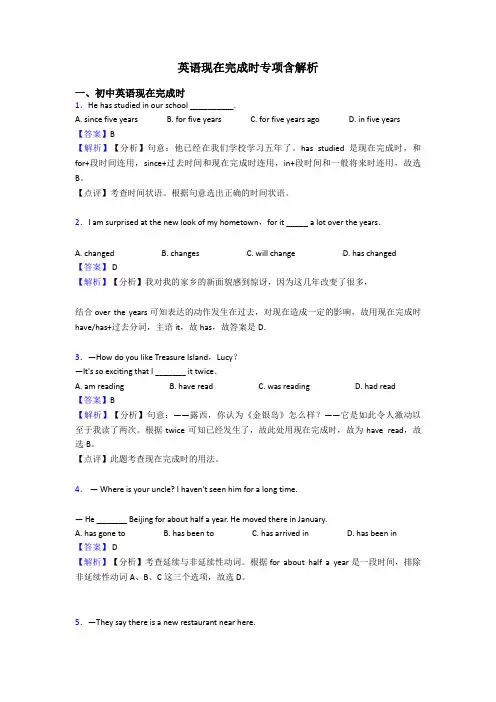
英语现在完成时专项含解析一、初中英语现在完成时1.He has studied in our school __________.A. since five yearsB. for five yearsC. for five years agoD. in five years【答案】B【解析】【分析】句意:他已经在我们学校学习五年了。
has studied是现在完成时,和for+段时间连用,since+过去时间和现在完成时连用,in+段时间和一般将来时连用,故选B。
【点评】考查时间状语。
根据句意选出正确的时间状语。
2.I am surprised at the new look of my hometown,for it _____ a lot over the years.A. changedB. changesC. will changeD. has changed【答案】 D【解析】【分析】我对我的家乡的新面貌感到惊讶,因为这几年改变了很多,结合over the years可知表达的动作发生在过去,对现在造成一定的影响,故用现在完成时have/has+过去分词,主语it,故has,故答案是D.3.—How do you like Treasure Island,Lucy?—It's so exciting that I _______ it twice.A. am readingB. have readC. was readingD. had read【答案】B【解析】【分析】句意:——露西,你认为《金银岛》怎么样?——它是如此令人激动以至于我读了两次。
根据twice可知已经发生了,故此处用现在完成时,故为have read,故选B。
【点评】此题考查现在完成时的用法。
4.— Where is your uncle? I haven't seen him for a long time.— He _______ Beijing for about half a year. He moved there in January.A. has gone toB. has been toC. has arrived inD. has been in【答案】 D【解析】【分析】考查延续与非延续性动词。
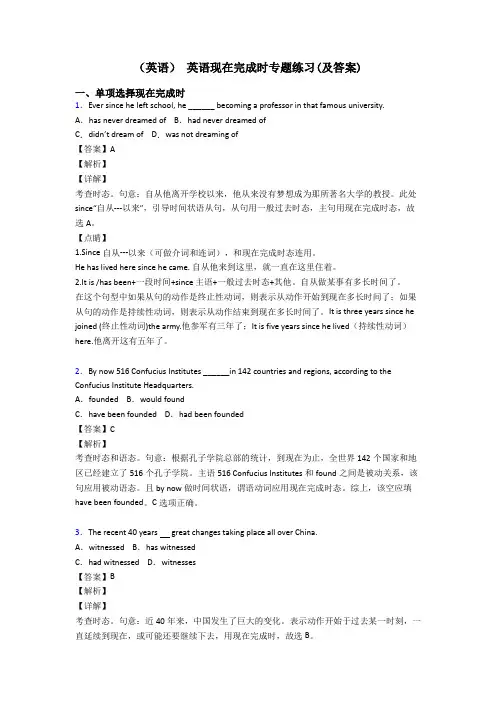
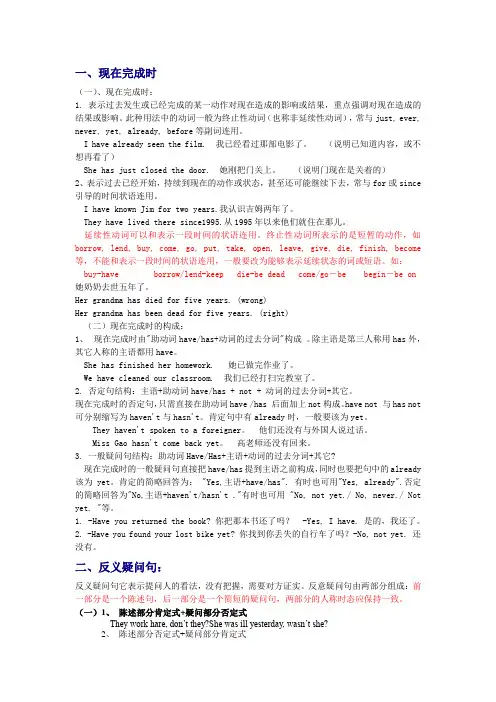
一、现在完成时(一)、现在完成时:1. 表示过去发生或已经完成的某一动作对现在造成的影响或结果,重点强调对现在造成的结果或影响。
此种用法中的动词一般为终止性动词(也称非延续性动词),常与just, ever, never, yet, already, before等副词连用。
I have already seen the film. 我已经看过那部电影了。
(说明已知道内容,或不想再看了)She has just closed the door. 她刚把门关上。
(说明门现在是关着的)2、表示过去已经开始,持续到现在的动作或状态,甚至还可能继续下去,常与for或since 引导的时间状语连用。
I have known Jim for two years.我认识吉姆两年了。
They have lived there since1995.从1995年以来他们就住在那儿。
延续性动词可以和表示一段时间的状语连用。
终止性动词所表示的是短暂的动作,如borrow, lend, buy, come, go, put, take, open, leave, give, die, finish, become 等,不能和表示一段时间的状语连用,一般要改为能够表示延续状态的词或短语。
如:buy-have borrow/lend-keep die-be dead come/go-be begin-be on 她奶奶去世五年了。
Her grandma has died for five years. (wrong)Her grandma has been dead for five years. (right)(二)现在完成时的构成:1、现在完成时由"助动词have/has+动词的过去分词"构成。
除主语是第三人称用has外,其它人称的主语都用have。
She has finished her homework. 她已做完作业了。
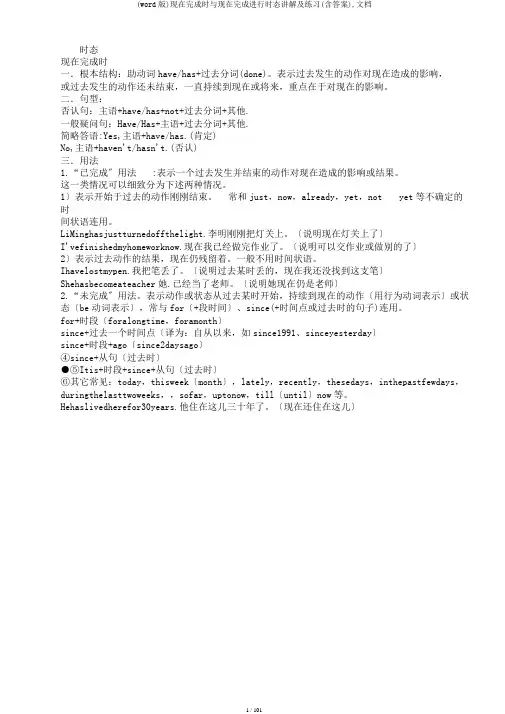
时态现在完成时一.根本结构:助动词have/has+过去分词(done)。
表示过去发生的动作对现在造成的影响,或过去发生的动作还未结束,一直持续到现在或将来,重点在于对现在的影响。
二.句型:否认句:主语+have/has+not+过去分词+其他.一般疑问句:Have/Has+主语+过去分词+其他.简略答语:Yes,主语+have/has.(肯定)No,主语+haven't/hasn't.(否认)三.用法1.“已完成〞用法:表示一个过去发生并结束的动作对现在造成的影响或结果。
这一类情况可以细致分为下述两种情况。
1〕表示开始于过去的动作刚刚结束。
常和just,now,already,yet,not yet等不确定的时间状语连用。
LiMinghasjustturnedoffthelight.李明刚刚把灯关上。
〔说明现在灯关上了〕I'vefinishedmyhomeworknow.现在我已经做完作业了。
〔说明可以交作业或做别的了〕2〕表示过去动作的结果,现在仍残留着。
一般不用时间状语。
Ihavelostmypen.我把笔丢了。
〔说明过去某时丢的,现在我还没找到这支笔〕Shehasbecomeateacher她.已经当了老师。
〔说明她现在仍是老师〕2.“未完成〞用法。
表示动作或状态从过去某时开始,持续到现在的动作〔用行为动词表示〕或状态〔be动词表示〕,常与for〔+段时间〕、since(+时间点或过去时的句子)连用。
for+时段〔foralongtime,foramonth〕since+过去一个时间点〔译为:自从以来,如since1991、sinceyesterday〕since+时段+ago〔since2daysago〕④since+从句〔过去时〕●⑤Itis+时段+since+从句〔过去时〕⑥其它常见:today,thisweek〔month〕,lately,recently,thesedays,inthepastfewdays,duringthelasttwoweeks,,sofar,uptonow,till〔until〕now等。
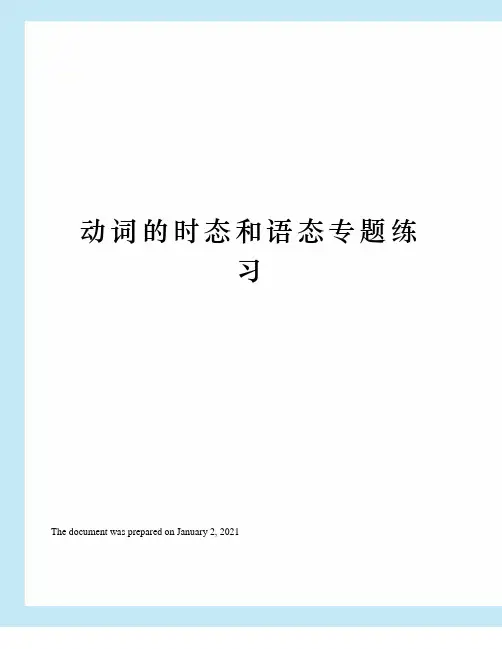
动词的时态和语态专题练习The document was prepared on January 2, 2021高中英语语法时态和语态一.动词的时态时态是谓语动词所表示的动作或情况发生时间的各种形式.英语动词有16种时态,但是常见的只有九种:一般现在时、一般过去时、一般将来时、现在进行时、过去进行时、现在完成时、过去完成时、过去将来时、现在完成进行时.(一)一般现在时do / does1.具体用法1 表示经常性或习惯性动作We always care for each other and help each other. 我们总是互相关心互相帮助.He goes to school every day.2)表示现在的特征或状态He is very happy.Do you sing ----A little.3)表示普遍真理Light travels faster than sound. 光速比声速快.Actions speak louder than words. 行动胜过言语.常与一般现在时态连用的词或短语主要有:often, usually, sometimes, every day, every morning/afternoon, on Sundays/weekends等等.I often go to the cinema on Sundays. 我经常星期天去看电影.He goes to work early every day. 他每天上班很早.二一般过去时 did1表示过去某一特定时间所发生的、可完成的动作或状态,常与表示确切过去时间的词、短语或从句连用.例如:We went to the pictures last night and saw a very interesting film.2表示过去习惯性动作.例如:He always went to class last.I used to do my homework in the library.三一般将来时 will / shall do1表示将来打算进行或期待发生的动作或状态.例如:I shall graduate next year.2一般将来时有时可以表示一种倾向或习惯性动作.如Crops will die without water.You won’t succeed without their support.3 几种替代形式:be going to +v在中广泛使用,表示准备做或将发生的事情.例如:I'm going to buy a house when we've saved enough money.be to +v表示计划安排要做的事,具有"必要"的强制性意义.例如:I am to play tennis this afternoon.be about to +v表示即将发生的事情.例如:He was about to start.be due to +v表示预先确定了的事, 必定发生的事.例如:The train is due to depart in ten minutes.5少数动词如:begin, come, leave, go, arrive, start, stop, return, open, close等的一般现在时可用来表示将来的动作.多用来表示按计划事先安排好即将发生的动作,句中通常还有一个表示将来的时间状语.例如:The meeting begins at seven.The train starts at nine in the morning.四现在进行时 is / are doing1)表示现在某时或某段时间内正在进行的动作.常与现在进行时连用的词组是now, right now,at the mother,for the time being,for the present, 或某个具体的时间几点钟.He is writing a letter now.She is visiting Beijing this week.2)有时用来代替一般现在时态,表示一个经常性动作或状态,这时是为了表示一种感情如赞叹,厌烦,满意,不满等He is always thinking of his work. 表示赞许The boy is always talking in class. 表示不满3 有时用来表示一个在最近按计划或安排要进行的动作这时多有一个表示未来的时间的状语We are leaving on Friday. 我们星期五动身.How many of you are coming to the party五现在完成时have / has done1现在完成时用来表示对目前状况仍有影响的,刚刚完成的动作常与yet,already,just连用,或者过去某一时刻发生的,持续到现在的情况常与for,since连用.例如:I have just finished my homework.Mary has been ill for three days.2常与现在完成时连用的时间状语有:since, for, during, over等引导出的短语;副词already, yet, just, ever, now, before, often, lately, recently等;状语词组this week morning, month, year, so far, up to now, many times, up to the present等.例如:So far, she hasn't enjoyed the summer vacation.There have been a lot of changes since 1978.3完成时态可用在下列结构中:This That, It is was the first second... time +定语从句;This That, It is was the only last + n +定语从句;This That, It is was +形容词最高级+ n +定语从句.如果主句的谓语动词是一般现在时,从句的谓语动词通常用现在完成时;如果主句谓语动词是一般过去时,从句谓语动词通常用过去完成时.例如:1This is one of the rarest questions that have ever been raised at such a meeting.2There was a knock at the door. It was the second time someone had interrupted me that evening.六过去进行时 was / were doing过去进行时表示一个过去的动作发生时或发生后,另一个过去的动作正在进行,或表示过去反复的习惯,常与always,continually,constantly等动词连用.例如:1We were discussing the matter when the headmaster entered.2Whenever I visited him, he was always writing at the desk.七过去完成时 had done1表示过去某时间前已经发生的动作或情况,这个过去的时间可以用by,before等介词短语或一个时间状语从句来表示;或者表示一个动作在另一个过去动作之前已经完成.例如:1We had just had our breakfast when Tom came in.2By the end of last year they had turned out 5, 000 bicycles.2动词expect, hope, mean, intend, plan, suppose, wish, want, desire等用过去完成时,表示过去的希望、预期、意图或愿望等没有实现.例如:I had meant to take a good holiday this year, but I wasn't able to get away.另外两种表示"过去想做而未做的事"的表达方式是:1was / were + to have done sth, 例如:We were to have come yesterday, but we couldn't.2intended expected, hope, meant, planned, supposed, wished, wanted, desired + to have done sth, 如:I meant to have told you about it, but I forgot to do so.3过去完成时常用于以下固定句型:1hardly, scarcely, barely + 过去完成时+ when + 过去时.例如:Hardly had I got on the bus when it started to move.2no sooner +过去完成时+ than +过去时.例如:No sooner had I gone out than he came to see me.3by the end of +过去时间,主句中谓语动词用过去完成时.例如:The experiment had been finished by 4 o'clock yesterday afternoon.八一般过去将来时1. 一般过去将来时的形式Should / would+ 动词原形was / were + 动词-ing形式2. 一般过去将来时常用于宾语从句中,其主语的谓语动词为过去时态,可表示从过去某时看来将要发生的事情,如:He said that he would speak at the meeting.He was sixty-eight. In two years he would be seventy.九现在完成进行时 has / have been doing现在完成进行时表示过去某一时刻之前开始的动作或状态一直延续到过去某一时刻.例如:I have been looking for my lost book for three days, but I still haven't found it.运用动词时态要注意的几个问题一在时间和条件等状语从句中不要用将来时态,如We’ll give him the book if he wants it.He decided to fight back if he was hit again.I’ll call you as soon as I’ve finished my work.二时态的一致时态的呼应,如We saw that the smoke was coming from a window.I didn’t know if she would come.He admitted that he had been on the march.不进行时态调整的情况:1从句说的是一种普遍真理,如:Long ago, people didn’t know the earth moves round the sun.2当从句的谓语改成过去时可能造成误会,如Did he say that the train leaves at 5:30三瞬间动词在完成时态中的使用,如:误:I have received her letter for three months.正:I received her letter three months ago.正:It is three months since I received her letter.四注意某些要求一定时态的句型was/ were doing sth. when …did sth.I was reading a book when the bell rangwas/were about to do sth. when … did sth.We were about to leave when the telephone rang.She was about to go out when it started to rain表示做事做了第几次或共几次,要用完成时态,如:It’s the first time I’ve seen her.We have been there three times.It is / has been… since…It is has been two weeks since I came here.She said it was five hours since she had finished her work.hardly…when…We had hardly got in the crops when it began to rain.Hardly had we got in the crops when it began to rain.no sooner…than…I had no sooner come into the room than the door was closed.No sooner had I come into the room than the door was closed.二.动词的语态语态也是动词的一种形式,英语有两种语态:主动语态和被动语态.主动语态表示主语是动作的执行者,而被动语态表示主语是动作的承受者.1We use electricity to run machines. 主动语态2Electricity is used to run machines. 被动语态1.不能用于被动语态的动词和短语1在英语中,不及物动词不能用于被动语态,但有些不及物动词包括短语容易引起误用.如:appear, belong, belong, die, escape, fall, happen, last, remain, succeed, occur, come true, take place, consist of.2某些表示状态或特征的及物动词,如:become, contain, cost, fit, have, resemble, suit也没有被动语态.2.被动语态的时态形式常用的被动语态有下表所列的几种时态形式.时间一般时进行时完成时现在 am asked am being askedis asked is being askedare asked are being asked过去 was be asked was being askedwere be asked were being asked将来 shall be asked shall have been asked will be asked will have been asked过去 should be asked should have been asked将来 would be asked would have been asked 3.短语动词的被动语态短语动词转换为被动语态时,通常被看作是一个动词,后面的介词或副词不能拆开或省略.例如:1So far no correct conclusion has arrived at.2All the rubbish should be got rid of.4."get + -ed分词"的被动语态"get + -ed分词"结构强调动作的结果,而非动作本身,常用来表示突发性的,出乎意料的偶然事件.例如:The boy got hurt on his way home from work.另外,"get + -ed分词"还可用于谈论为自己做的事,是主动的行为而不是被动的行为.例如:get dressed穿衣服 get divorced离婚get engaged订婚get confused迷惑不解get lost迷路get washed洗脸get married结婚5.被动语态与系表结构的区别1The novel was well written.系表结构2The novel was written by Diskens.被动语态6.不能用于被动语态的及物动词,如:have, fit, hold, lack, cost…I have a computer.The hall can hold 200 people.7. 主动性式表被动意义①当feel、look、smell、taste、sound等后面接形容词时;当cut、read、sell、wear、write等词带状语修饰语时;当动词表示“开始、结束、关、停、转、启动”等意义时.This kind of cloth washes easily.这种布易洗.These novels won’t sell well.这些小说不畅销.My pen writes smoothly.我的钢笔写起来很流畅.The door won’t lock.门锁不上.The fish smells good.鱼闻起来香.②当break out、take place、shut off、turn off、work out等动词表示“发生、关闭、制定”等意思时.The plan worked out successfully.The lamps on the wall turn off.③want, require, need后面的动名词用主动表示被动含义.④be worth doing用主动形式表示被动含义.⑤在“be + 形容词+ to do”中,不定式的逻辑宾语是句子的主语,用主动代被动.This kind of water isn’t fit to drink.The girl isn’t easy to get along with.另外:be to blame受谴责,be to rent出租也用主动形式表被动.Choose the right answer1. They _____ friends since they met in Shanghai.A. have madeB. have becomeC. have beenD. have had2. The secretary is going to report to the manager as soon as he ______.A. will arriveB. arrivesC. is going to arriveD. is arriving3. We all know that ice ______.A. feel coldB. is felt soldC. is feeling coldD. feels cold4. ---This cloth _____ well and _____ long.--- OK. I’ll take it.A. washes ; lastsB. is washed; lastedC. washes, is lastedD. is washing, lasting5. Helen _____ her key in the office so she had to wait until her husband_____ home.A. has left; comesB. left; had comeC. had left; cameD. had left; would come6. It _____ every day so far this week.A. is rainingB. rainedC. rainsD. has been raining7. --- Are you going to the movies tonight--- Yes, I ______ my work by that time.A. will finishB. finishC. am going to finishD. will have finished8. --- Was the driving pleasant when you vacationed in Mexico last summer--- No, it _____ for four days when we arrived, so the roads were very muddy.A. was rainingB. would be rainingC. had been rainingD. has rained9. You won’t know if the coat fits you until you _____ it on.A. will tryB. are tryingC. triedD. have tried10. My dictionary _______, I have looked for it everywhere but still _______.A. has lost; don’t findB. is missing; don’t findC. has lost; haven’t foundD. is missing; haven’t found11. --- How long ______ each other before they _____ married--- For about a year.A. have they known; getB. did they know; were going to getC. do they know; are going to getD. had they known; got12. --- Come in, Peter, I want to show you something.--- Oh, how nice of you. I _____ you _____ to bring me a gift.A. never think; are goingB. never thought; were goingC. didn’t think; are goingD. hadn’t thought; were going13. When Jack arrived he learned Mary _______ for almost an hour.A. had goneB. had set offC. had leftD. had been away14 --- I’m sorry to keep you waiting.--- Oh, not at all. I ______ here only a few minutes.A. have beenB. had beenC. wasD. will15. The police found that the house _______ and s lot of things ______.A. has broken into; has been stolenB. had broken into; had beenstolenC. has been broken into; stolenD. had been broken into; stolen16. --- Have you moved into the house--- Not yet. The rooms ________.A. are being paintedB. are paintingC. are paintedD. are beingpainting17. If the city noises _______ from increasing, people ______ shout to be heard at the dinner table 20 years from now.A. are not kept ; will have toB. are not kept; have toC. do not keep; will have toD. do not keep, have to18. --- ________ the sports meet might be put off.--- Yes, it all depends on the weather.A. I’ve been toldB. I’ve toldC. I’m toldD. I was told19. I don’t think Jim saw me; he ______ into space.A. just stared 凝视B. was just staringC. has just staredD. had just stared20. --- _______ my glasses--- Yes, I _______ them on your bed a minute ago.A. Do you see; sawB. Had you seen; have seenC. Have you seen; sawD. Would you see; saw21. --- We could have walked to the station; it was so near.--- Yes. A taxi _______ at all necessary.A. wasn’tB. hadn’t beenC. wouldn’t beD. won’t be22. --- Who is Jerry Cooper--- ______ I saw you shake hands with him at the meeting.A. Don’t you meet him yetB. Hadn’t you met him yetC. Didn’t you meet him yetD. Haven’t you met him yet23. --- Nancy is not coming tonight.--- But she _______A. promisesB. promisedC. will promiseD. had promised24. _______ it with me and I’ll see what I can do.A. When leftB. LeavingC. If you leaveD. Leave25. It is clear that his poor education _______ him back.A. has been heldB. is holdingC. will be heldD. had held26. --- How are you planning to travel to Shanghai--- I ____ yet, but I ______ taking a train.A. haven’t decided; am consideringB. haven’t decided, considerC. didn’t decided; am consideringD. hadn’t decided; haveconsidered27. The pen I _______ I _______ is on my desk, right under my nose.A. think, loseB. thought , had lostC. think , had lostD. thought, have lost28. --- Have you heard about the new school--- No, when and where to build the new one _______ yet.A. is not decidedB. are not decidedC. hasn’t decidedD. haven’t decided29. --- Sorry, I’m late.--- That’s OK. I _____ long.A. haven’t waitedB. don’t waitC. haven’t been waitingD.didn’t wait30. --- Nancy sat in the front seat on the left side of the classroom.--- Oh I thought she ______ in the back.A. will sitB. had satC. is sittingD. has sat31. I ______ my face when suddenly someone ______ at the door.A. washed, knockedB. washed, was knockingC. was washing, was knockingD. was washing, knocked32. I ______ at the station half an hour ago, but the train _____ yet.A. arrived, hadn’t comeB. was arriving, hadn’t comeC. arrive d, hasn’t comeD. had arrived, didn’t come33. --- Why did you come by taxi--- My car broke down last week and I still _______ it repaired.A. haven’t hadB. didn’t haveC. don’t haveD. won’t have34. I’m surprised to find you here looking well and playing tennis, Jim. Annsaid that you _____ sick.A. areB. wereC. would beD. had been35. The price _________, but I doubt whether it will remain so.A. went downB. will go downC. has gone doneD. was going down36. --- Did you go to Qingdao for vacation last August--- I _______ to go, but I got sick at the last minute.A. was planningB. had been planningC. plannedD. have planned37. I finally got the job I dreamed about. Never in my life _____ so happy.A. did I feelB. I feltC. I had feltD. had I felt38. --- How are you today--- Oh, I ________ as ill as I do now for a very long time.A. didn’t feelB.wasn’t feelingC. don’t feelD. haven’t felt39. The reporter said the UFO ______ east to west when he saw it.A. was travellingB. travelledC. had been travellingD. was totravel40. --- I think that you need ______ practice on playing the violin.--- ______ violin lessons every two weeks, but I think I’ll make it every week from now on.A. less; I haveB. less; I’ve takingC. more; I haveD. more; I’ve been having41. I remember ______ for the job, but I forget the exact number.A. to be paidB. being paidC. get paidD. that I receive pay42. By this time you come, I ______ the task ______ to me last month.A. have finished, givenB. will have finished, to be givenC. will have finished, givenD. have finished, to be given43. There was a knock at the door. It was the second time that someone ______ me that evening.A. to have interruptedB. would have interruptedC. had interruptedD. to interrupt44. ---- It is a long time ______ I saw you last.---- Yes. And it will be a long time ______ we see each other again.A. before, sinceB. since, beforeC. then, thenD. when, when45. We ______ that you would be able to visit us, but you did not.A. hopeB. hopedC. had hopedD. are hoping46. Mary felt both unprepared and nervous about the interview which she______ the next day.A. was bout to faceB. is going to faceC. will faceD. was to face47. In such dry weather, the flowers will have to be watered if they ______.A. have survivedB. are to surviveC. would surviveD. will survive48. ---- Are you member of the club---- ______. It’s ten years since I ______ a member of the club., was B. No, became C. Yes, had been D. No, was49. She ______ law the moment she has finished high school.A. is going to studyB. is to studyC. is about to studyD. will be studying50. The bikes produced in that factory are of high quality. So they ______ well both at home and abroad.A. sellB. are soldC. may be soldD. are to be sold。
现在完成时和现在完成进行时的练习B。
Complete the following sentences with the right form of the verbs given.(根据所给动词的适当形式填空)1.You know。
I have been looking for a job for three months。
and this is my first formal interview.2.My sister stayed in Beijing for three months last year.3.The little boy is dirty all over because he has been playingin the mud all morning.4.I was wondering if you were free this afternoon.5.Here he is。
We have been waiting usly for him since last night.C。
Make the best choices.(选择题)1.—I’m sur e Andrew will win the first prize in the final.I think so。
He has been preparing for it for months。
(2008江苏)D。
has been preparing2.By the time he realizes he has walked into a trap。
it’ll be too late for him to do anything about it。
(2008山东)D。
has walked3.So far this year we have seen a fall in house prices by een 5 and 10 percent。
Ⅰ. 单项选择( )1. The flight from Beijing to New York ______ at 9:45 am. on Friday.A. gets offB. takes offC. puts upD. gets up( )2. — ______ have you been living here?— For ten years.A. How muchB. How manyC. How longD. How soon( )3. — _______ did you first skate? — Two years ago. A. When B. What C. Why D. How ( )4. I have been skating________two hours. A. in B. at C. for D.since( )5. Thanks for ____ me the book. A. gave B. giving C. give D. to give( )6. Mr Green ____________ in China since five years ago.A. livedB. has been livingC. livesD. is going to live( )7._______ is the meeting going to last? ----About twenty minutes.A. How farB. How soonC. How longD. How often( )8. ----What shall we do now? --- _______ for a walk?A. How's about to goB. What about to goC. How's about goingD. What about going( )9. Do you have another way of __________ the child?A. teachingB. to teachC. teachesD. teach( )10. There _________ a pair of sports shoes under the bed.A. areB. isC. haveD. has( )11. There are many trees on __________ sides of the road.A. eachB. everyC. bothD. all( )12. I’ve _________ here all afternoon.A. satB. sitC. sittingD. been sitting( )13. He has been____________for his credit card for an hour.A. looksB. looked.C. lookingD. to look( ) 14. Mike learns a lot about internet , and____________.A. I don’t ,eitherB. so do IC. so am ID. I am ,too( )15.Do you know if ____back next week? If he____back ,please let me know.A. he comes , will comeB. he comes , comesC. he will come , comesD. he will come , will come( ) 16. Every day I spend two hours________my homework.A. finishing to doB. finishing doingC. to finish to doD. to finish doing( ) 17. The teacher told us yesterday that December 25 ________ Christmas Day.A. isB. wasC. has beenD. will be( ) 18. My mom says____I have to stop , because we have run out of room to store them.A. thatB. whereC. ifD. what( ) 19. He has been watching English movies________about two months.A. sinceB. forC. inD. during( ) 20. My aunt arrived here _____________ a warm spring morning.A. inB. atC. onD. by( ) 21. Hurry up , ___________ you’ll be late for class.A. butB. orC. andD.if( ) 22. It’s time for supper now. Let’s ________ it.A. stop havingB. stop to haveC. to stop to haveD. stopping to have( ) 23. There are many tall green trees on ________ side of the street.A. eitherB. bothC. allD. every( ) 24---Must I go with them tomorrow? ------No , you___________A. mustn’tB. shouldn’tC. needn’tD. can’t( ) 25. I’ll do my__________ to help him finish the work.A. goodB. wellC. bestD. betterⅡ.用所给动词的正确形式填空。
动词时态练习题1.Our boss, Mr. Smith, ___________ a raise in salary for ages, but nothing has happened yet.A.was promisingB.has been promisingC.has promisedD.promised答案:B翻译:我们的老板史密斯先生多年来一直承诺要加薪,但什么都没有发生。
选项:A 过去进行时B 现在完成进行时C 现在完成时D 一般过去时解析:”for+一段时间“常用于现在完成时,而由后半句的“nothing has happened yet”表明承诺加薪这件事将从过去一直持续到未来,所以选择B现在完成进行时。
拓展:(1)for+一段时间,不能接时间点since+时间点(2)has been doing 是现在完成进行时, 基本用法:1) 表示一个在过去开始而在最近刚刚结束的行动2) 表示一个从过去开始但仍在进行的行动3) 表示一个从过去开始延续到现在,可以包括现在在内的一个阶段内,重复发生的行动4) 现在完成时强调动作行为的结果、影响,而现在完成进行时只强调动作行为本身2.By the middle of the 21st century, the vast majority of the world’s population ________ in cities rather than in the country.A.are livingB.will be livingC.have livedD.will have lived答案: B翻译:到21世纪中叶,世界上绝大多数人口将生活在城市而不是乡村。
选项:A. 正在进行时B. 将来进行时C. 现在完成时D. 将来完成时解析:从“By the middle of the 21st century”以及句意可以看出,“世界上绝大多数人口将生活在城市而不是乡村”这件事是在将来完成的,故选B将来完成时。
江苏牛津高中英语高一英语备课组M2 Unit 1 Grammar--- Present perfect tense and Present perfect continuous tenseStep 1. Explanations一. 通常使用现在完成时的几种情况:(have/ has done)1 表示发生在过去或已经完成的某一动作对现在造成的影响或结果。
--- ______ __ you _____ _____ (have)your lunch yet?--- Yes, I have. I’ve just had it.2. 表示过去已经开始,持续到现在的动作或状态.1) I haven’t seen her these days.2) He ______(live) here since he came here.3. 和already, never, ever, just, before, lately, recently, yet, so far, up to the present, up till now, in the past/ last few years等状语连用。
1) Tom __________ (do) his homework already.2) --- Have you ever been to Beijing?--- No, I have never been there.4. 表示刚刚完成的动作。
The police ______ just ________ _____ (finish) searching the area.5. 表示发生多次的动作或表示反复习惯性的动作,常于several times, once, twice, three times, frequently 等频度副词连用。
1) I _________ (see) the films several times.2) He has been to London twice.6. 在“最高级+名词”或在“这是第几次”之后跟定语从句,从句用现在完成时。
现在完成时练习题I. 用never, ever, already, yet, for, since填空1.I have _______ seen him before, so I have no idea about him.2.Jack has _________ finished his homework ________ an hour ago.3.Mr. Wang has taught in this school ________ ten years.4.“Have you ________ seen the film”“No, I have ________ seen it.”5.“Has the bus left _______”“Yes, it has _________ left.”II. 用since和for填空A. 1) ______ two years 2) _______ two years ago 3) _______ last month4) ______ 1999 5) _______ yesterday 6) _______ 4 o’clock7) ______ 4 hours 8) _______ an hour ago 9) _______ we were children10) _____ lunch time 11) ______ she left hereB. 1. He has lived in Nanjing ________ the year before last.2. I’ve known him __________ we were children.3. Our teacher has studied Japanese _________ three years.4. She has been away from the city ___________ about ten years.5. It’s about ten years __________ she left the city.6. I've been practicing the piano since 10∶30.7. Mario has been running ____ 15 minutes.8. Sarah has been sleeping ____ 9∶00.9. Dale has been talking on the phone ____ five minutes.10. Louie has been studying Chinese ____ he was six years old.11. I've been watching you ____ ten minutes.12. She?has?done?her?homework?_________?two?hours.13. Tom?has?been?swimming??_________?an?hour.14. They?have?learnd?English?________?they?came?to?school.15. They?have?been?in?the?room?__________8?o’clock.16. We?have?studied?English?_________several?years.17. I?have?been?living?in?Xi’an?_________I?was?born.18. She?has?worked?here?_________?2006.19. Mary?has?been?running?_________?she?came?here.20.?Ann?has?been?learning?English?since?2003.(选出同义词组)A.?for?2003B.?since?about?6?years?C.?6?years?agoD.?for?about?6?yearsIII. 用过去时或现在完成时填空:1. “_________ you __________ (write) a letter to your aunt yet”“Yes, I ___________. I ________________ (write) one last week.”2. “_________ he ___________ (finish) his homework”“Not yet.”3. “_________ they ever __________ (be) abroad”“Yes, just once.”4. Your father _________ just ___________ (finish) his work.5. Your father _________ (finish) his work just now.6. Last term I __________ (learn) many English words.7. They ____________ (not read) the interesting books yet.8. He _____________ never ____________ (go) to the science museum.9. ____________ you ever ____________ (drink) coke10. “____________ you _____________ (buy) a dictionary ““Yes, I __________ .”“Where __________ you _____________ (buy) it”“ I ___________ (buy) it in a bookstore.”“When ___________ you _____________ (buy) it”“ Yesterday.”IV. 划线提问1) I have been there for two days.__________ _________ __________ you __________ __________1)My father has lived here since 2000._________ _________ __________ your father _________ __________2)He left here yesterday._________ ________ he _________ __________3)They bought a book two hours ago.__________ ___________ they __________ a bookV. 用have/has been to/in, have gone to及go的各种形式填空。
1)Where is Jack He __________ his country.2)John _______ England since he came back.3)The Smiths ______ Beijing for years.4)_____ you ever ____ America -- Yes, I _____ there many times.5)I _____ this school since three years ago.VI.句型转换:1. He has already gone _________ __________ home ____________. (否定句)____________ he __________ home ___________ (疑问句) 2. He has lunch at home. He __________ _____________ lunch at home. (否定句)____________ he __________ lunch at home (疑问句)3. He has been there twice. ______ _______ ______ _______he been there (划线提问)4. They?have?been?talking?for?the?whole?three?hours.(一般疑问句)________they?________??________for?the?whole?three?hours?5. They?have?been?playing?football?for?two?hours.(就划线部分提问)__________??__________have?they?been?playing?football?6. She?has?studied?English?for?two?years.?(?同义句)_____________________________________________________VII. Answer the questions.1.Q: How long have you been working in this restaurant (two years) A: I've been working here for two years.2.Q: How long has your sister been working here (June)A: She has ________________________3.Q: How long has that man been waiting (twenty minutes)A: He has ________________________4.Q: How long has that woman been sitting there (8∶30)A: She has ________________________5.Q: How long has that boy been talking on the phone (five minutes) A: He has ________________________6.Q: How long have you been talking to me (ten minutes)A: I've ________________________。